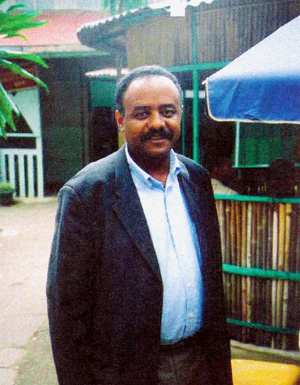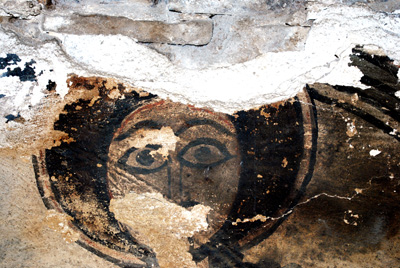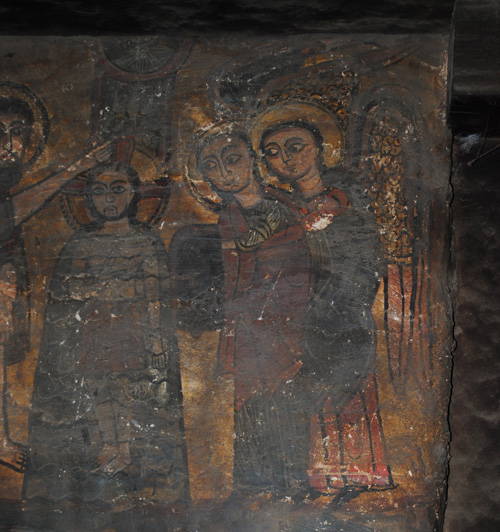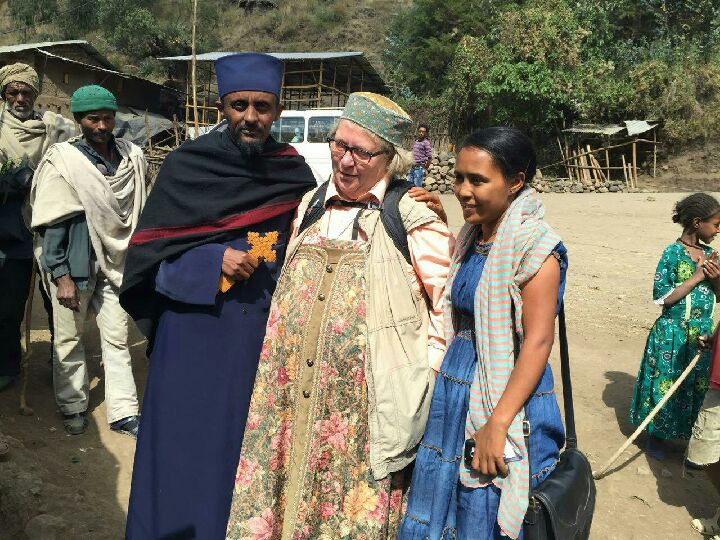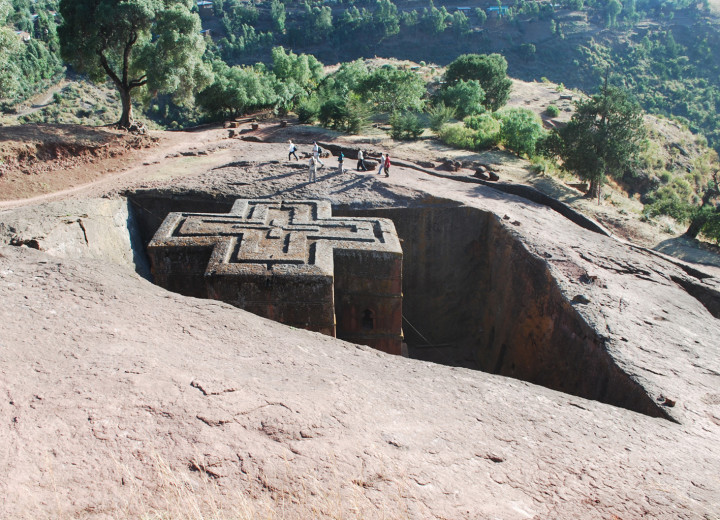IN MAY 2015 a workshop and a consultative meeting took place in Addis Ababa respective Lalibela.
The workshop was dedicated to the issue of higher education in conservation and was held May 15 in the conference hall of ARCCH’s headquarter, situated just in front of the National Museum. The chairman was Professor Shiferaw Bekele, Addis Ababa University and the altogether 30 participants represented Swedish Universities and the board of SCECH, three Ethiopian Universities, Authority for Research and Conservation of Cultural Heritage (ARCCH), The Ethiopian Tewahedo Orthodox Church, Ethiopian Airlines and the recently established NGO named The Ethiopian Historic Heritage Conservation & Development Association (EHHCDA). Find below program, list of delegates and a summary of what was discussed.
Professor Shiferaw Bekele, Chairman of the conference. © SCECH
Workshop on graduate education in conservation in Ethiopia, Addis Ababa, May 15, 2015
| No. | Event | Time | Responsible Person |
| 1 | Welcoming Speech | 9:00–9:15 | Ato Yonas Desta, Director General of ARCCH |
| 1 | Welcoming Speech | 9:15–9:30 | Architect Fasil Giorghis (AAU-Chair EiABC) |
| 2 | Essence of the Conference (Workshop) | 9:30-9:45 | Prof. Samuel Rubenson, Chairman of SCECH, Lund University |
| 3 | Key Note Speech | 9:50-10:00 | Ato Amin Abdulkadir (Minster of Culture & Tourism) or Ato Mulugeta Said (State Minister of Culture and Tourism) |
| 4 | Key Note Speech | 10:00-10:15 | His Holiness, the Patriarch or His Grace Abune Samuel (Archbishop of EOTC Development & Inter Church Aid Commission) |
| 5 | Tea Break | 10:15-10:35 | Ardi Cafeteria |
| 6 | Coptic Experiences of Heritage Conservation | 10:35-10:55 | Abba Maksimos, from the Monastery of St. Anthony, Head of Coptic Heritage in Egypt |
| 7 | Heritage Conservation and Education in Ethiopian Higher Institutions | 10:55-11:10 | Mengistu Gobezie, AAU, Lund University (Doctoral Student) |
| 8 | Development and Establishment of Conservation Education and Research in Ethiopia | 11:10-11:30 | Dr. Jacob Thomas, Department of Conservation, Univ. of Gothenburg |
| 9 | Discussion | 11:30-12:00 | Ass. Prof. Inger Lise Syversen (Architecture, Chalmers Univ. of Technology, Gothenburg). |
| 10 | Conclusive remarks | 12:00-12:30 | Dr. Kindeya Gebrehiwot (Mekele University President)
Architect Fasil Giorghis & Prof. Samuel |
Participants:
- Samuel Rubenson, Lund University, chairman of SCECH
- Inger-Lise Syversen, Chalmers University, SCECH board
- Jacob Thomas, Gothenburg University
- Jesper Blid Kullberg, Lund University/Stockholm University, Archaeologist
- Mengistu Gobezie Worku, Lund University/Addis Ababa University, PhD candidate
- Professor Shiferaw Bekele, Addis Ababa University
- Fasil Ghiorghis, Addis Ababa University
- Mersha Allehegn, Addis Ababa University/ Mahibere Kidusan
- Abate Mekuria, Addis Ababa University/ Mahibere Kidusan
- Kindeya Gebrehiwot, Mekele University, President
- Tesfay Girmay, Mekele University
- Leul Yohannes, Gondar University
- Meseret Getaneh, Gondar University (Dean), Tourism and Heritage Management
- Alemu Haile, ARCCH
- Temesgen Letta, ARCCH
- Menkir Haile, ARCCH
- Habtamu Tesfaye, ARCCH
- Degsew Mekonen, ARCCH
- Abba Kaletsidiq, EOC
- Abba Habte Mariam, EOC
- Merigeta Zelalem, EOC
- Kesis Daniel Seifemikeal, EOC
- Belay Worku, EOC
- Seife, Mhibere Kidusan
- Worku, Mahibere Kidusan
- Amare, Mahibere Kidusan
- Melkamu Mamo, Tour operator
- Yared, Tour operator, Ethiopian Airlines
- Kesis Hailemariam Ayalew, EOC, EHHCDA
- Deacon Tesfaye Aemro, EHHCDA
The meeting started with the welcoming speech of architect Fasil Ghiorghis who emphasized on the deterioration of Ethiopian cultural heritage at an alarming rate and the pressing need of collaboration between institutions working in the area in order to ensure their conservation in sustainable way. Then, Professor Shiferaw Bekele took the chair and forwarded some remarks stressing on the indispensability of co-operation for the conservation of numerous Ethiopian heritage which are found in great danger. Professor Shiferaw invited Professor Samuel Rubenson who provided a brief speech on the background, objectives, aims and the general essence of the consultative meeting.
Water damages in the famous ceiling with painted cherubim’s in the Church of Debre Berhan Sellasie, Gonder. Gondarine painting on wood. First part of the 19th century. © SCECH
Ato Leul Yohannes (Head of Tourism and Heritage Management Department) from Gondar University and Ato Tesfay Girmay (Director of The Institute of Conservation and Paleoenvironment) from Mekele University shared their experiences respectively how they run and deliver courses of heritage conservation. Both presenters emphasized that they lacked practical aspects in their teachings of heritage conservation. Both of them also mentioned their strong connections with the local communities of heritage sites particularly with Ethiopian Orthodox church. Mekele University provided considerable multi- dimensional assistance to the monasteries of Tigray region and Gondar University engaged in short term trainings of various stakeholders and promoting and assisting traditional church school system. Their presentation was followed by some questions and comments from the participants.
Severely damaged and soiled face of Christ in the murals of Debre Selam Mika’el, Atsbi Platau, Tigrai. Detail from the Majestas Domini, North wall, North aisle, painted in a style reminding of medieval Coptic painting. Attribution unknown. Between 8th and 10th century. © SCECH
MA. Mengistu Gobezie provided a brief presentation on the current status of heritage conservation education in Ethiopian higher institutions mainly focusing on Addis Ababa, Gondar and Mekele Universities. Ato Mengistu tried to show the gaps and consequences of the teaching-learning process of heritage conservation education in those institutions. He commented on the incompatibility of higher institutions heritage conservation education to the demand of the country and emphasized on the absence of proper balance between theory and practice both in the curriculum and method of teaching.
After tea break Dr. Jacob Thomas, member of the travel team from Gothenburg University shared how his department run and manage conservation education. He also briefed the proposal of the development and establishment of practically oriented heritage conservation education and research in Ethiopian higher institutions which has designed for ten years and intended to include all programs, both at undergraduate and post graduate levels. Then, professor Inger-Lise Syversen, from Chalmers University (member of the travel team) took the chair and gave the floor to the participations for discussion after providing the summary of presentation made by Ato Mengistu Gobezie and Dr. Jacob Thomas. Participants raised several issues and many of them highlighted on the importance of the training proposal and expressed their commitment towards its implementation.
Cleaning test made by the painting restorer Lars Gerdmar in dry technic (soft Akapad sponge) of the faces of two angels during SCECH’s preliminary ocular and technical examination of buildings and paintings in the heritage site of Yimrihanne Kristos 2012. Mural: The baptism of Christ, north wall of the north aisle. A secco on wall, presumable 12th century. Attribution unknown. © SCECH
Finally, important closing remarks were made by Professor Shiferaw Bekele (chair of the entire program), architect Fasil Ghiorgis, Dr. Kindya Gebrehiwot (Mekele University president) and Professor Samuel Rubenson. Dr. Kindeya appreciated the project proposal and the consultative meeting and promised to share the issue to presidents of other Universities in their meeting so that the project and its consequent implementation will be given proper attention. Professor Samuel thanked organizers of the consultation and participants of the successful meeting.
In line with SCECH’s charter (find this by the first link on the page ”SCECH” on this web site) and our wish to work in close collaboration with our Ethiopian colleagues and friends, a consultative meeting took place in Lalibela just two days after presented workshop. Present here were besides the Swedish group, participants from the ecclesiastical, communal and cultural authorities of Lalibela and the Lasta district as well as a businessman from Addis Ababa. The meeting was dedicated to issues about basic training in awareness and preservation, long-term education in conservation and managements of cultural heritage and several other important issues related to preservation, training and research, and as to the latter Abba Haile Gabriel especially raised the issue of the need for archaeological research on a number of sites related to the ancient churches in the region. Find below list of participants and Professor Samuel Rubenson’s minutes from the meeting.
Minutes from consultative meeting at Bete Abraham Hotel, Lalibela
May 17, 2015
Present:
Abba Tilahun, Head priest of the churches of Asheten Maryam and Ne’akuto Le’ab
Abba Welde Qirqos, Head priest of the church of Yemrihane Kristos
Abba Haile Gabriel, General Manager of Ethiopian Orthodox Churches of Lasta district
Merigeta Yemane Birhan, Member of the church administrative council of Lalibela
Woyzerit Adera, Head of culture and tourism office of Lasta district
Ato Habteamu, Head of cultural heritage conservation in culture and tourism office of Lalibela
Professor Inger-Lise Syversen, conservation program Chalmers University
Dr. Jacob Thomas, Dept of Conservation, Gothenburg University
Dr. Jesper Blid Kullberg, Archaeologist, Stockholm University
Ato Mekonnen Gebre Mesqel, Secretary General of Lalibela church administration
Ato Getu Wedadju, Director cultural centre of Lalibela, member of the church council of Lalibela
Qesis Mengistu Gobezie, Lecturer Addis Ababa University/PhD candidate Lund University
Ato Moges Teferra, Cultural tourism operator at Lalibela culture and tourism office
Woizero Mulu, Member of church council of Lalibela
Professor Samuel Rubenson, Centre for Theology and Religious Studies, Lund University
Deacon Sebseb Genenaw, Member of church council of Lalibela
Ato Sentayehu, Businessman, Addis Abeba
Ato Tadesse Beyene, Vice-mayor of Lalibela and head of Lalibela culture and tourism office
Deacon Yihenu Melku, Vice chair of the church administrative council of Lalibela
Abba Welde Quirqos, head priest of the church of Yimrihane Kristos and another priest from village. © SCECH
After presentations of all present Qesis Mengistu introduced the purpose of the meeting and opened up for discussion. A number of issues were raised by the representatives of the churches and the government agencies of the Lalibela region after which the Swedish delegation presented their ideas. The points discussed were summarized by Professor Samuel Rubenson as follows:
- Basic training in awareness and preservation.
It is urgent to raise awareness in the local communities and churches about the dangers threatening the cultural heritage and to provide elementary training in preservation, management and conservation of the heritage. This should include:
- a) training of priests and other responsible persons in how to clean buildings and objects in a proper way
- b) development of methods and forms to prevent further destruction, preventive conservation
- c) elementary teaching in conservation including awareness of the dangers of using improper methods and unwise conservation
- d) presentation of examples of good conservation
It was suggested that local training camps could be held in cooperation between the local church authorities and the Swedish organization “Cultural Heritage without Borders” (CHwB). The local churches would be responsible for the organization, the selection of Ethiopian participants and all costs for accommodation, meals, and local transport. The Swedish part would provide professional instructors, training instruments and pay their travel to Ethiopia. The Swedish delegation will present this topic to CHwB.
- Long-term education in conservation and managements of cultural heritage.
The plan to open a branch of Weldiya University devoted to education in Cultural heritage preservation and tourism management in Lalibela presents a good opportunity for local training in heritage preservation and management. It was agreed that it is important that the curriculum of the university education in Lalibela has a strong emphasis on practical skills.
The government and church agencies in Lalibela undertake to contact Weldiyya University to express their needs and suggest collaboration with Gothenburg University in creating the curriculum.
SCECH’s suggested Head restorer for the paintings in Yimrihane Kristos conservation and education project, Madam Helena Nikkanen, visiting the churches in Lalibela and its surroundings 2016, accompanied by Abba Haile Gabriel, General Manager of Ethiopian Orthodox churches of Lasta district and Wiozerit Adera, Head of Culture and Tourism Office of Lasta district. Photographer unknown.
- Long-term education of conservation specialists.
At a previous meeting in Addis Ababa a framework for cooperation between Swedish and Ethiopian universities (AAU, MU and GU) was presented. This framework is planned to begin with courses for professionals within the field of cultural heritage focused on training in practical skills through field work. It was suggested that Weldiya University should be invited to participate when the local branch in Lalibela has been established.
The local authorities in the Lalibela region are encouraged to present and offer sites suitable for field camps.
One of the ugly shelters provided by UNESCO and built by a Finnish company with observed instability by the local authorities, seen over the church of the Holy Saviour. One of the 11 renowned rock-hewn Churches in Lalibela. 12th century. © SCECH
- The shelters for the rock-hewn churches in Lalibela.
The representatives of the churches and government voiced their grave concern for the security of the churches in view of the danger of a collapse of one or more of the shelters provided through UNESCO. The shelters were initially planned to serve for five years but now they are used for many additional years. The construction is of limited durability and there have been observations of instability. This has been stated in the reports sent from the local authorities but has not received any response.
It was decided that the local authorities forward their reports to Professor Inger-Lise Syversen who will use her contacts to raise the issue with the responsible persons in UNESCO.
- Twin city relation
The vice-mayor of Lalibela, Ato Tadesse, asked if it would be possible to establish a twin city partnership between Lalibela and a Swedish city. The suggestion was welcomed by the Swedish delegation and it was agreed that the ideal would be a city of equal size with a strong church heritage. Ideally the partnership could include a relation also between the church of Lalibela and the church in the Swedish city
Professor Samuel Rubenson promised to investigate the possibilities and make contact with church and community representatives in suitable cities.
The church of Saint George, the only rock-hewn church in Lalibela without any shelter. © SCECH
- Training of Ethiopian professionals and instructors.
The possibility for sending students to Sweden for professional training in practical conservation was raised. It was agreed that there is a strong need for professional conservators and instructors in Ethiopia, but it was pointed out that the Swedish education in conservation is probably not the one best suited since it is not adapted to the Ethiopian tradition and the Ethiopian natural and cultural environment. Professor Samuel Rubenson pointed out that the Coptic Orthodox Church, which is a sister church of the Ethiopian Orthodox Church and shares much of the same cultural heritage, has rich experiences and good competence in conservation, which should be utilized.
It was decided to approach Abba Maximous al-Antuni, who is in charge of the Coptic cultural heritage and investigate the possibilities of establishing a contact in order to promote education in conservation.
- The need for archaeological research
Abba Haile Gabriel raised the issue of the need for archaeological research on a number of sites related to the ancient churches in the region. This was warmly welcomed. Dr. Jesper Blid Kullberg will undertake to investigate possibilities of financing Swedish participation in excavations.
Lalibela, May 17, 2015-05-29
Professor Samuel Rubenson
Links to: Workshop 2013 – Restore or lose forever: presentation, program and abstracts Rewarding interaction with ARCCH and the permission document Preliminary examination of Yimrihane Kristos
